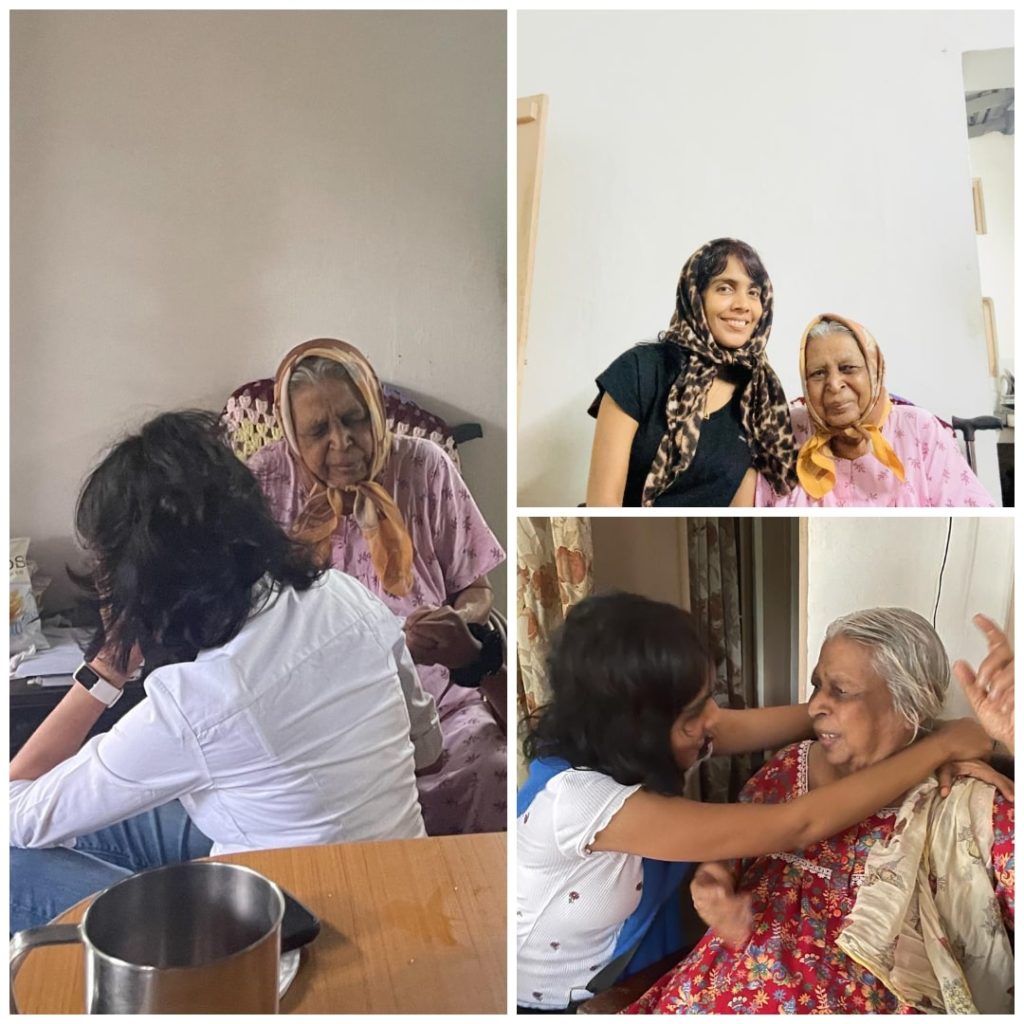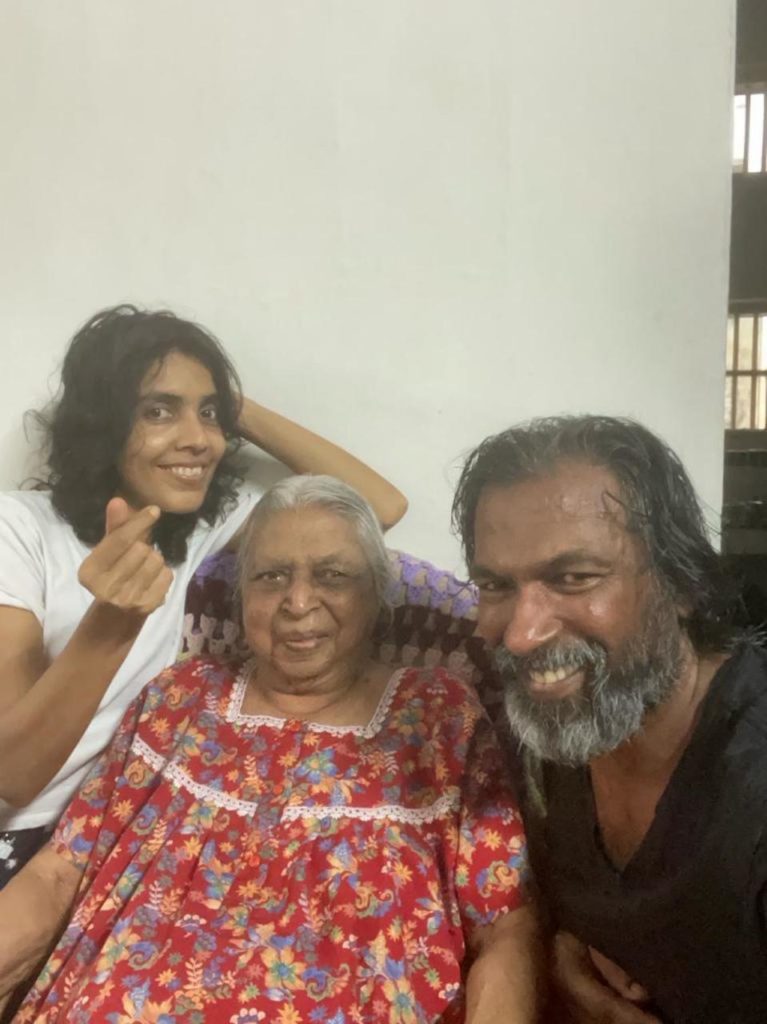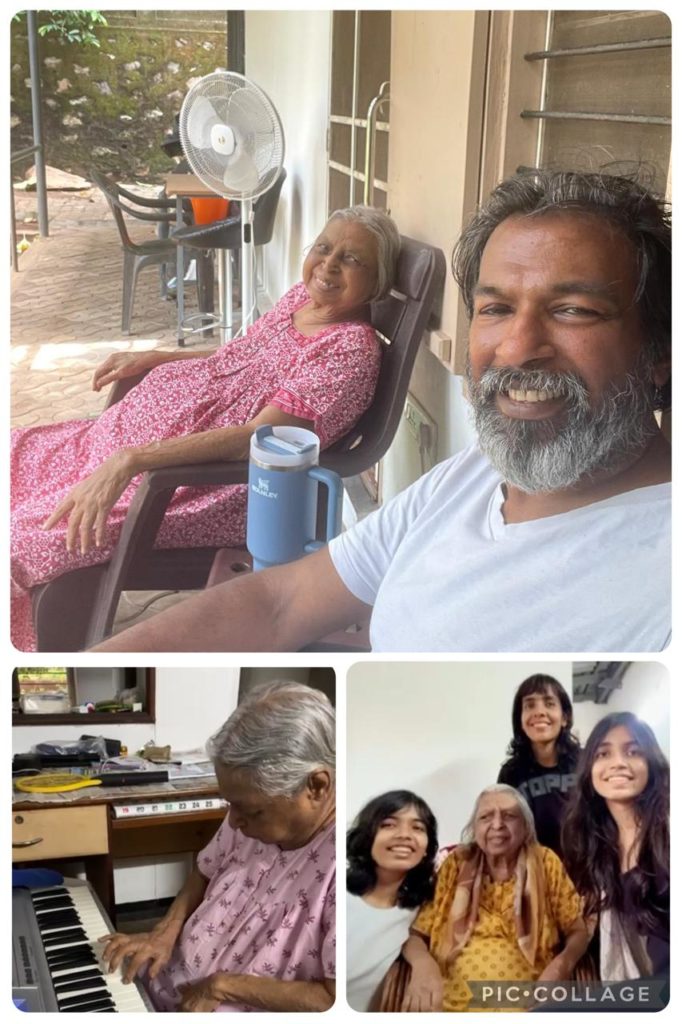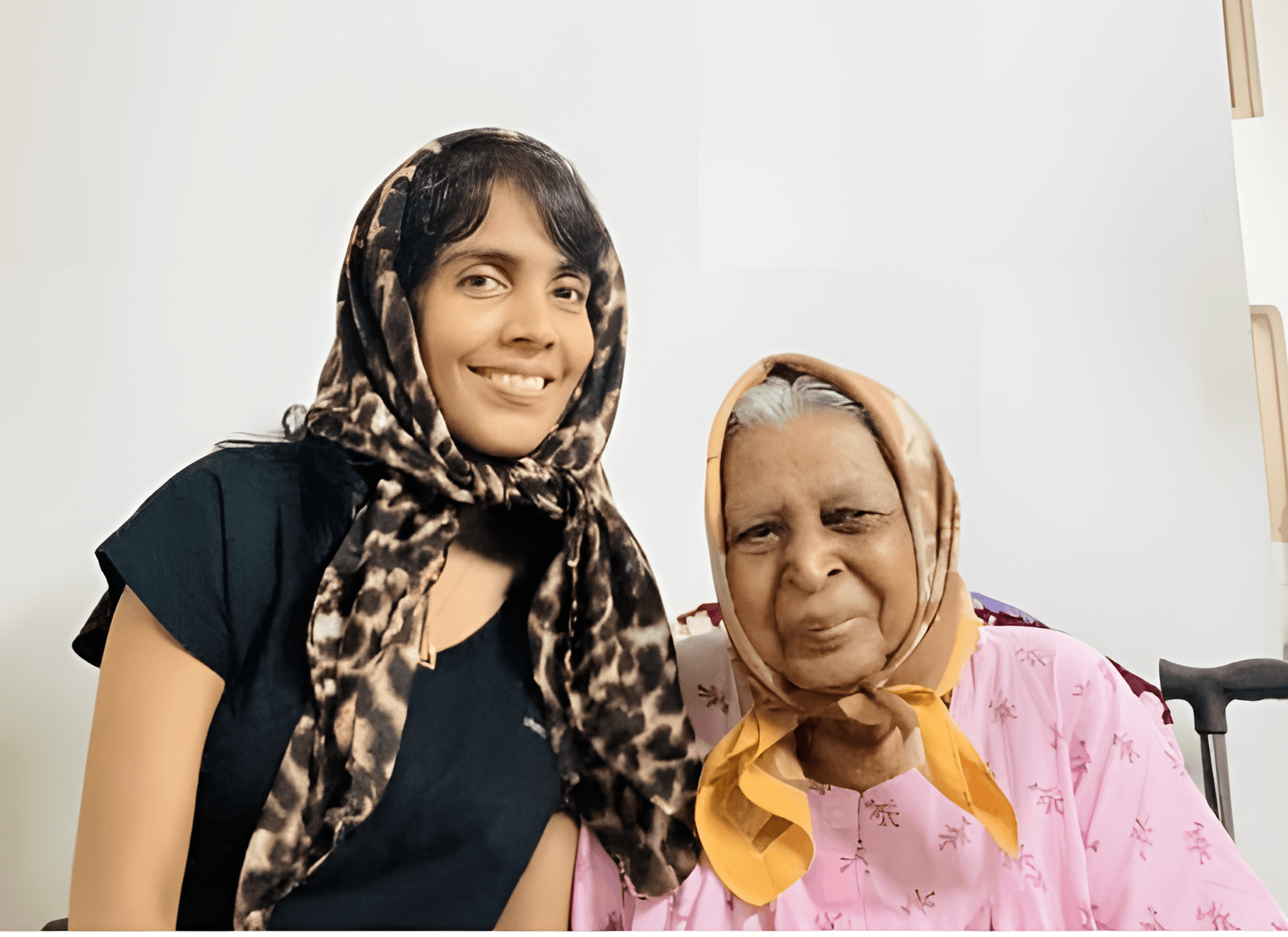By Dr. Elsa Lycias Joel
The taxi took me down west cliff gardens down the steep lane. It pulled up to gate 27. Before I could step out of the car to open the gate, it opened wide. Friendly smiles, warm words and hugs welcomed me in. At the first glimpse of the house, I knew it was home, a home that would embrace me. Though it all felt like my first visit despite my mom telling me I had been there as a child, there was a strong sense of déjà vu all around me. I walked straight to the dining room. There sat the loveliest human, someone I was about to fall in love with. Settled into the seat across from her, I introduced myself. She was too quick to place me, remembered my grandmother and parents and listened to me patiently as if she was waiting for a human library. Her son Nirmal aka Jacob Aruldhas came across as the most hospitable human and patient listener too. When I think back, I realize he was good at prompting a garrulous person to talk even more.When lunch was served, it was the food I relished anywhere, all the time. Rice, rasam, aviyal, papadam and fried sardines is something I’d ask for as my all-weather favorite meal. “How did they know it’ did I tell them earlier”, I contemplated. There was no formal exchange of greetings or hospitality. Everything fell in place, like the 1001st get together. Amidst conversations that drifted from food pairings to the loss of nutrients and the antagonistic effects of certain combinations on the body, Nirmal steered the discussion to something far more specific. With a glint of conviction, he demonstrated how a fried sardine should be consumed entirely. It was the kind of statement made not for debate, but as a shared secret passed down through habit, taste and the simple knowing that we came from similar kitchens. The sounds of the neighborhood, the trees and plants in the backyard, the smell of jackfruit and fish in the kitchen, conversations with the gardener about how to sow, lay bunds, and the right time to harvest certain vegetables, the breeze, and Paati’s humming of worship songs I had long forgotten took me back to my childhood days at my grandmother’s home.

After lunch, I didn’t want to leave that home to the room that was booked for me somewhere, closer to the office only because the hosts decided or assumed that I’d prefer a posh comfy place. However, my travel bag already found its way upstairs. Whatever the room at the top of the stairs was going to look like or had to offer, I decided to stay back. “Is someone here able at mind reading” I reckoned. It was time for Paati’s nap and as I climbed up the wooden staircase slowly to the room upstairs, memories of my childhood rushed to my mind and head at such speed making my pace grow slower. It was an old wooden staircase that led to my father’s room, a quiet space nestled on the upper floor of our sprawling ancestral home. The room itself was simple with a mattress laid out on the floor, and six small windows that framed my childhood world like fragments of a dream. Two of those looked out onto the narrow channel that flowed gently behind our house, catching the shimmer of late afternoon and early morning light. Beyond it were rows of coconut thatch huts and farther still, a mountain that stood like a silent guardian on the horizon. Two more opened to a small courtyard we fondly called Chuthukattu, where the smell of rain on terracotta tiles lingered after each rain. Another window sat just near the top of the last staircase, offering a partial view of a custard apple tree, four-o’clock flowers, and the familiar kitchen door that led out to the yard. The last window, my favorite, faced the front yard. It gave a full view of everybody who came and went, including my father who never really liked the idea of me foraging his space.

Then, of course, the wooden staircase that led to the attic at my grandmother’s house, a treasure trove of memory and mischief. It was more than just a store for old books and antiques; it was a secret realm shared by spiders, lizards, mice, and cats. A place where time slowed down, where stories slept in dusty trunks and cobwebbed corners waited to be rediscovered.
After all those memories flooded through me, I realized I had reached this room in Daisy Paati’s house. The staircase was the same, but the destination had changed. One sweep of my eyes and I sploshed onto the bed. Four curtainless windows ushered in a breeze that seemed to pooh-pooh the tired pedestal fan, which greeted me with a wheeze and a hum, as if saying, “Oh, I’m quite old and I’ve got stories to tell too.” Somewhere between the chattering of mynahs, the fan’s rusty lullaby, and my wandering thoughts if I’d soon be whisked away to some unfamiliar resort room, I drifted off to sleep. My phone buzzed softly a couple of times, stirring me awake to a message from Nirmal. His words were straightforward and familiar, “It’s teatime.” Then, with that teasing confidence only old friends share, he added, “And if you want coffee, we make the best latte in the world.” It gave me an impression that the qualities like control, grace, and attention to detail, the very traits that make a good tango dancer could also make someone an excellent barista.
Me being the tea person I enjoyed the tea with some Medhu Vadais that were bought from a local teashop. Once again, I pondered “How did they know I love vadais or is their favorite combo too?” The day was almost ending and Paati once again thought aloud about whether I should head my room at the resort before it got dark. Without a moment’s hesitation, I told Paati that I loved being in her home and had no intention of going anywhere else. Like any other doting mom, she immediately turned to her son, checking if he was comfortable sleeping in the bed beneath the staircase. Half-heartedly, I began to consider moving to the room originally booked for me. But Paati, with quiet insistence, reminded me that it was already dark outside and that morning would be the best time to leave. In her world, “very late” meant no later than 6 PM. Though her love for my presence was unmistakable, Paati’s priority seemed clear. Like any mom, she wanted her son to sleep well and comfortably. The gentle negotiation between family love and practical care played out softly in that old house, making me feel not just welcome, but truly at home. Dinner was awesome. Paati enjoyed her prayer time with me. She mentioned my name more than a dozen times in her prayer.
Before bedtime, we decided to work on Nirmal’s community development projects and a few of his talks. He showed me his plans to uplift lives that exist in economically and socially disadvantaged regions of the world, talked of his big plans with childlike enthusiasm and gratitude flowed from every cell in his body. Being mentored by great men of humility and wisdom, he seemed to have intuitively gained all the noble qualities needed to serve mankind. The clock struck 10.30. I didn’t yawn, was as fresh as a rose after that refreshing afternoon nap and yet, he asked me “Isn’t it time for bed?”. This time, I wasn’t amused, nor did I wonder. I was genuinely shocked because in my entire lifetime I’ve never had the energy or mindset to stay up past 10:30 PM, unless the situation absolutely demanded it. I was certain that the warmth and character of the room far surpassed the polished sophistication and charm of some distant luxury hotel room reserved on my behalf. He told me that the curtainless windows would give me a sense of being in the middle of a jungle, I may either love or hate. In a tone that carried both care and quiet curiosity, he a suggested that if I might fear the silhouettes of trees swaying in the dark, the distant calls of night birds, or the soft scurrying of palm civets across the attic beams above, I can always use one of the rooms at the lower level that offers minimum visibility but offers more amenities like temperature control and artificial breeze. There was something deeply comforting about his effort to make sure the night felt less unfamiliar, less foreign.
I woke up to a honk and our helper Saramma’s loud lively enquiries confirmed it was the fish monger. It looked like another usual morning in that house, comfortably predictable. Nirmal was multitasking: giving instructions to the gardener, taking office calls, conducting meetings, and getting busier by the minute. Paati, ever attentive to others’ needs suggested I sit beside her. She asked if I’d slept sound, I’d dreamt anything and whether I needed warm water for a bath. That string of ordinary questions reassured me that I was home. Paati’s enthusiasm to be a part of all that happened in the house was evident in the questions she asked and suggestions she made. When Emily, and I went upstairs to practise a song, she insisted that we practice in her presence. If we danced, she wanted to see. And when she played the keyboard, she insisted that we sing along.

Another day was drawing to a close, and with a heavy heart, I prepared to leave for the night so everyone could return to their own rooms and rest well. Since we were gearing up for an event the next day, I felt it was important for all of us to get the rest and quiet we deserved. After tea, I gently told Paati I’d move to my other room before 6 PM but without missing a beat, she blurted out that I must stay with her.
What relief and quiet joy it brought. It wasn’t the beginning of a beautiful bond for it had long been there, quietly rooted, strong and unshaken. Still, it felt like an affirmation: I had found a home as soul-holding as my own. From that moment on, I walk in and walk out. I give and I receive. I speak and I’m heard. I sit in silence, and her prayers carry me to a place of solace. I arrive weary and leave lighter. Every time we meet, I offer care, and she receives it as companionship. I count my blessings when Paati lovingly asks me for the things I customize just for her. Not everyone in this world is lucky enough to have that chance.
With every new insight I gain about her, I find myself drawing closer, my soul filled with even greater respect and a quiet, growing adoration. Widowed at a very young age with three children, ranging from 4 to 10 years of age, she drew strength from His grace and faced life with steadfast courage. Her deep-rooted values and unwavering determination shaped her children into individuals who embody integrity, purpose, and grace in the way they have been living their lives.
In addition to her formal role as a qualified high school Biology teacher within the public school system, she also took on the responsibility of teaching English in the school, not because it was her primary area of qualification, but because the school had a need and she was exceptionally capable in the subject. She devoted the same passion and dedication to helping children in her neighborhood who struggled to embrace the language after coming through Malayalam medium, guiding them to achieve passing grades in their board exams. She had a way of making even the trickiest grammar feel easy like when she explained tenses by saying, with a smile, “If there’s an ‘is’ in the sentence, ’was’ has no business being there! She made Nirmal help the children with Mathematics, and in doing so, Paati introduced her children to the values of community involvement from an early age.
Occasionally, she forgets things, struggles to recall memories or the details of certain incidents. It doesn’t bother me; I know it’s a natural part of aging. But what continues to surprise me is how vividly she remembers Psalms, promises, and verses from the Bible, word for word. When our conversations end and we leave her to herself, she quietly recites those scriptures. Her failing eyesight no longer allows her to read The Book, but the verses are etched in her mind and heart, like words carved in stone. The way she effortlessly recites scripture from memory is a testament to how deeply she relied on the Word for comfort, peace, and strength as she raised her children entirely on her own, without any human support.
Despite the economic hardships Paati endured while raising three children on a modest salary, she never borrowed money or accepted favors from anyone. Through her quiet resilience, she not only shielded her children from unwanted obligations but also instilled in them the strength to live within their means and make the most of whatever little they had. She even taught them to grow their own vegetables so they wouldn’t have to spend on buying them.
It was from this foundation that their love for growing vegetables and fruit-bearing trees took root. Both Jacob and his sister Dorothy have green thumbs and have cultivated gardens so abundant that they can live off the land. Dorothy, in fact, has been recognized by the local Panchayat for her work in integrated farming, an achievement she entirely credits to the way her mother raised her.
She lived by the examples set in the Bible. As a widow with a modest salary, she still made it a point to serve a humble Sunday afternoon lunch in her home to her church members after the service. The meal comprised Payaru Kanchi, Aviyal, and Chammanthi . Anyone who come to know of this can’t help but be reminded of the widow in the Bible who gave two coins, everything she had, with all her heart and I’m no exception.
Paati proudly owned an old sewing machine that she had inherited from her parents. It travelled with the family through Malaysia and Singapore before finally finding its home in Nanthencode, where it was put to full use. She truly embodied the saying, “A stitch in time saves nine.” Neighbours often brought their torn clothes to Paati for mending, as there was only one other tailor in the area who stitched only new clothes and was considered a bit expensive. True to its name, the Singer sewing machine sang its quiet songs, each stitch a note in the melody of daily life, with Paati as the graceful conductor, turning everyday problems into simple solutions.
One unforgettable incident, truly beyond compare and in a league of its own, was when Paati helped a blind beggar who came to her house for alms by patiently sorting through a mixture of items he had received, so he could more easily identify and access them later.
Above all else, after my maternal grandmother passed away, my daughters found a kindred spirit in Daisy Paati. Through my association with her, they began to understand something timeless: that we don’t find love in just one place or one person. In this world, we are created to give and receive love in countless ways, through presence, memory, gestures, and sometimes, simply by being there at the right time for someone whenever, wherever, or however they need us, in whatever capacity.
I write this piece because I’ve learned the value of documenting emotions. My daughters write letters to Paati, fully aware that each one brings joy to both her heart and mine.


